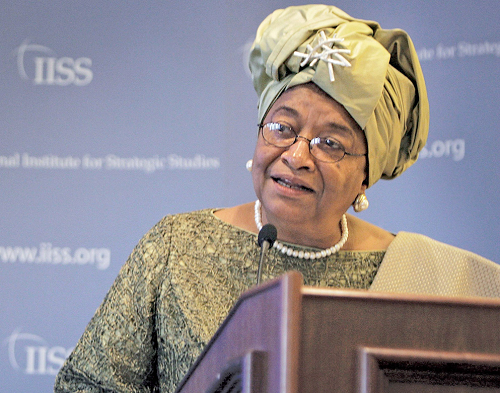
Leverage AfCFTA to enhance economic integration - Ellen Johnson Sirleaf
The Former President of Liberia, Ms Ellen Johnson Sirleaf, has said that the Africa Continental Free Trade Agreement (AfCFTA) provides a ready vehicle for countries in the region to start the process to move towards more self-reliance to regional cooperation and integration.
She said that Africa might well be at the crossroads because the pandemic hit at a time when multilateral and global collective action was under threat due to nationalism, isolations and exclusion.
She said it had also exposed deep seated inequities, injustices with its extra effects on economies.
“There is a call to ensure that as we respond to the pandemic there is national budgetary allocation so that we don’t use official development assistance (ODA) but national efforts should be excelled.”
“What path does Africa follow at this cross roads? Should it continue with the status quo of trying to be strong advocates for the continuation of support, and how do we achieve that? She quizzed during the third African Transformation Forum (ATF) held virtually.
Speaking on Africa’s transformation journey in the era of COVID-19 pandemic, Ms Sirleaf, who is also the Chair of the Transformation Leadership Panel (TLP), that works to foster deep rooted change across Africa’s 54 countries, noted that many of the countries had indeed started well and might be on the path for self-reliance.
“But how do we pull all the others into an integrated flow? The fragile states, the ones that have not performed so well, the ones that have constraints that are so strong with an environment that likes the private sector to create the jobs for the young people. It is a question for African leaders to address nationally, regionally and continentally,” she explained.
Read; AfCFTA Secretariat, African shippers’ councils sign MoU
Advertisement
Innovation and integration
The Regional Vice President at the World Bank Group (WBG), Mr Hafez Ghanem, corroborated that innovation could help integration in Africa and vice versa.
He said the WBG strongly believed that Africa needed to leapfrog in the area of innovation and, especially, in the digital area.
“I think that a reasonable objective should be that we have universal access to the internet in Africa by the end of this decade.
“It is an objective that is achievable and that is doable. But if we want to talk about universal access to the internet, we also need to talk about access to electricity and energy which is something that is very important too,” he said.
Read: Ghana has made Africa proud – Ellen Johnson Sirleaf
He said innovation was one of the major lessons learned from the pandemic such that countries that had access to the digital economy were able to function and created jobs.
“It is going to be more important as we go forward. Mobile money (Momo) has been important for financial inclusion. Many people in Africa who had no access to finance now do so through momo,” he said. (ACET)
However, he said there was the need to invest more in infrastructure (connectivity) and also developing the regulatory framework to encourage innovation and investment in technology.
The ATF
The ATF was held under the auspices of the African Centre for Economic Transformation (ACET) that has over the past 30 years been at the forefront of Africa’s transformation agenda.
Its goal is to help governments and the private sector to deliver economic transformation that improves lives.
Subsequently, ACET established the TLP in 2019. It is a body of 17 eminent figures from Africa and around the world united by a shared vision and mission: to influence, support and advise leaders on critical and necessary action to achieve transformative change in Africa by 2030.
African Transformation Report
The ATF also featured the launch of the third edition of ACET’s flagship publication, ‘African Transformation Report: Integrating to Transform, 2021’ explores the critical need for African countries to work together beyond trade to tackle shared challenges, harness regional opportunities, and enable economies to scale—and in turn, accelerate Africa’s economic transformation.
A Senior Fellow at ACET, Prof. John Asafu-Adjaye, said the AfCFTA offered an opportunity for African countries to move integration beyond just trade and markets, towards collaborating to address the long-term challenges that constrain Africa’s development.
He said the report tackled three of the frontline challenges to development, including; ensuring productive employment for Africa’s teeming workforce by giving them 21st century skills; supporting digital innovation by enabling the private sector to leverage digital technologies to create jobs, boost productivity and reduce poverty; and managing climate risks by promoting climate-smart agriculture, protecting green and blue ecosystems, and exploiting Africa’s abundant renewable energy resources.
“Africa’s growing youth bulge presents an opportunity to reap a demographic dividend to boost economic growth. To do this requires a comprehensive strategy that focuses on policy priorities such as creating opportunities for productive employment in labor-intensive sectors and scaling up education and skills training, particularly for girls, to ensure that workers are well equipped and productive,” he said.
He added that collaborating to integrate and integrating to transform would require dedicated leadership at all levels.
“This extends beyond politicians to include the public sector, private sector, academia, media and civil society,” he said.
